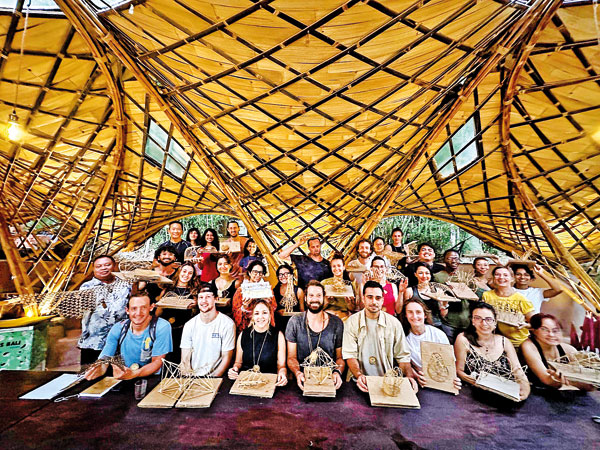Sunday Times 2
Bamboo: Sri Lanka’s untapped gold mine
View(s):By Dinnerli Fernando
Do you know that bamboo has the potential to become a major source of income for many people in developing countries? That’s right! Bamboo is a versatile material that can be used to create various products, from furniture, paper, and flooring to construction, clothing and more.
Moreover, since bamboo is a sustainable resource as its plants fully mature in four years, it is a lucrative material for industry.
Bamboo is quickly becoming one of the most popular materials for home décor and construction since it has benefits over traditional materials such as steel and timber. With its lower carbon footprint, strength, and durability, treated bamboo products can last for over 30 years.

Students at BambooU
The challenge in promoting bamboo cultivation in Sri Lanka is that it identifies bamboo as a tree that requires a licence to transport and harvest the material. But biologically, it is known to be a type of grass with a Rhizome root system. The Central Government of India recently categorized bamboo as grass, enabling its harvest from bamboo plantations. Also, not many people truly understand its potential as a sustainable material for the future. Therefore, investors in this niche industry are few.
One way to promote the industry is to allow local farmers to cultivate bamboo and sell it for carbon credits as many companies invest to offset their carbon footprint. Secondly, bamboo is used to replace steel in the construction industry. Companies like “Rhizome” are pioneers in the Philippines producing bamboo flooring, beams, and columns, which has an export market, especially to countries such as the UAE, Russia and Germany. These countries cannot grow bamboo naturally unlike in the tropics.
Sri Lanka has one of the best bamboo species—“Dendrocalamus asper”, which can be used for construction.
Creating small-scale agricultural enterprises utilising bamboo products is another option for improving livelihoods. This could include agro-forestry systems where edible soils are cultivated using natural fertilisers or composted materials, as well as producing charcoal known as Biochar, handicrafts, and othervalue-added products.
Have you heard of Aviation Biofuel? At present, Indian researchers are working on a project to extract oil from bamboo. As much as 40% oil can be extracted from bamboo and it can be processed to make the fuel that is used in aircraft.
Leave aside research on fuel, Sri Lanka should think of exploiting this opportunity. We are far behind in exploiting the benefits of the bamboo industry since we think that bamboo is poor man’s timber. Countries like India and the Philippines are constructing large-scale villas and housing, while Sri Lanka still imports its bamboo from Bali to construct luxury villas.
Tonnes of bamboo sticks are imported annually to weave boxes for tea leaf packing, Bamboo yarn for clothing, and bamboo culms for making flooring are among some local applications. These can be easily sourced from Sri Lanka if the cutting and splitting machinery is produced locally.
Over one million plants of bamboo have been planted from 2004 to date as claimed by the Mahaweli Authority. Surviving plants are scattered, because of poor aftercare in various locations and it is difficult to harvest and transport them.
To realise the potential of bamboo for new industries, it is necessary to raise plantations with suitable bamboo species. This is hindered due to the misinterpretation and myth that large-scale bamboo cultivation will deplete water in the soil. Bamboo is a grass and its roots do not penetrate deep into the soil. Bamboo is fast growing and will need water like any other trees and crops. During drought it sheds leaves to conserve water.
It is reported that bamboo in general is invasive. Bambusa bamboos (katu una) growing in some parts of the dry zone has grown extensively to become invasive. The local farmers do not harvest this because of the thorns but in India, it is utilised in many ways (for paper pulp, as a timber substitute etc.) Most of the land available for bamboo cultivation is state-owned and it is important to ensure the security of land tenure and ownership of plants to encourage cultivation.
Regretfully, unlike our neighboring countries, Sri Lanka is not utilising bamboo profitably although we are located in a region where bamboo grows naturally.
Its main use is in the handicraft sector and as scaffolding for building construction. The market potential for bamboo is immense. Therefore, what is required primarily is to increase the availability of bamboo resources, and machinery and to invest in bamboo plantations, which can also help to improve livelihoods.
Bamboo is highly durable and can be harvested multiple times without needing to be replanted. Bamboo offers an abundant renewable resource and plantations can act as a form of natural soil erosion control, helping to protect vital topsoil from being washed away during heavy rainstorms.
Importantly, mixed bamboo stands to provide a habitat for wildlife and create biodiversity.
As a young architectural graduate, I got the rare opportunity of a scholarship from BambooU out of 1600 applicants worldwide to attend a workshop in Bali, Indonesia. I met professionals from 13 countries. I am glad to share my experience and the potential of bamboo as a natural resource. Exploiting this resource can have multifarious advantages to our country.
A large number of young entrepreneurs are prepared to launch new businesses associated with the bamboo industry. Together, we can raise awareness of the potential of bamboo to reduce poverty and support economic growth.

